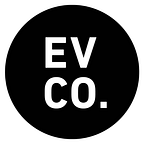Keep showing up.
Project infidelity is real. Many creative minds are drawn to project-based work; that is, work that has a time-sensitive beginning, middle and end. When a project surpasses the “build it” and “launch it” phases, it’s easy to lose interest and begin fantasizing about that next intoxicating adventure needed to feed your creative soul. It’s much more difficult to root into the work and stick around long enough for surprising, unforeseen outcomes to occur. And they do occur.
I spend my everyday in Cincinnati, OH immersed in the world of people-powered philanthropy. We’re two years into a five year initiative. Many days, I’ve been restless, fending off that urge to leap towards new projects, throwing caution and comfortability to the wind in favor of a fresh start—on my own terms. We’re neither at the beginning or the end of our work, but rather in that unsavory dip in the middle. Energy wanes, motivation slips.
With that in mind, I have to regularly remind myself why I’m doing what I’m doing—why I started down this road in the first place. I’ve outlined a short list of practices below that help me confidently move forward everyday.
- Make connections.
People. What it’s all about. Look your coworkers in the eye, share a meal, share a ride, share life. Say “Good Morning,” “Hello,” and “Goodnight.” Reach out to people you know and those you’d like to get to know. Ask someone you admire for a coffee, (the one’s worth admiring, will accept). Call, don’t email. Strong relationships are at the center of great work. Prioritize people—relationships—and the good work will flow. - Keep “important” in front of “urgent.”
In the doldrums of Monday–Friday, light lifts like answering email, reorganizing the office paper, tending to Instagram, etc. make us feel productive, but often, tasks like these distract us from the deep work—the real work. While there is a time and place for shallow work, resist the temptation to react to every tweet, cry or request and focus your energy on what matters most. Aim to spend at least three hours a day on the activities that stretch your brain and make you ask: “Can I do this?.” Shallow work, though necessary, doesn’t solve problems. Deep work, though challenging, reconnects you with those gnarly obstacles and big questions that likely attracted you to the work in the first place. - Expect obstacles; persist anyway.
Ruts happen. They’re inevitable. All of us, know matter how dreamy the job, get caught in that vicious cycle of routine, boredom and lethargy. We crave excitement yet ironically hold onto what makes us comfortable. Expect the hurdles but avoid the excuses for overcoming them. Too often, I find myself longing for radical change, dreaming in “if onlys.” If only my team worked faster. If only I could work remotely. If only I could start something new. If only I didn’t have to keep normal office hours. These are excuses. Often, it takes another person to help me identify that I’m being irrational and open my brain to new pathways. Sometimes big change is necessary, but generally small shifts are all we need to awaken from the haze. Resist the urge to throw in the towel every time a snag stifles progress. Persist. - Recognize the difference between “productivity” and “creativity.”
In a culture obsessed with efficiencies and instant-results, fostering an experimental, exploratory environment where it’s okay to ask big “what if?” questions can be challenging, especially when real timelines matter. Yet, an obsession with output for the sake of output can severely limit creativity. And the less we put our creative muscle to work, the quicker boredom and idleness sets in. Often, I have to remind myself to dial back the reactive work and remember to play. I schedule blocks of creative time in my calendar and rely on Google to remind me when it’s time to close the inbox, take a break from reactive work, and dream. - Take time for quiet and stillness.
Relax. It’s not that serious. Breathe. 30 minutes midday if you can manage. I often go for a solo walk around the neighborhood or sit on a park bench and close my eyes. Practicing gratitude also never hurts.
I’m learning. The best work, the game-changing work, takes time. Moreover, we take time — to grow, to learn, to practice, to get better. Malcolm Gladwell suggests that talent is merely the ability to practice. So…keep showing up.
